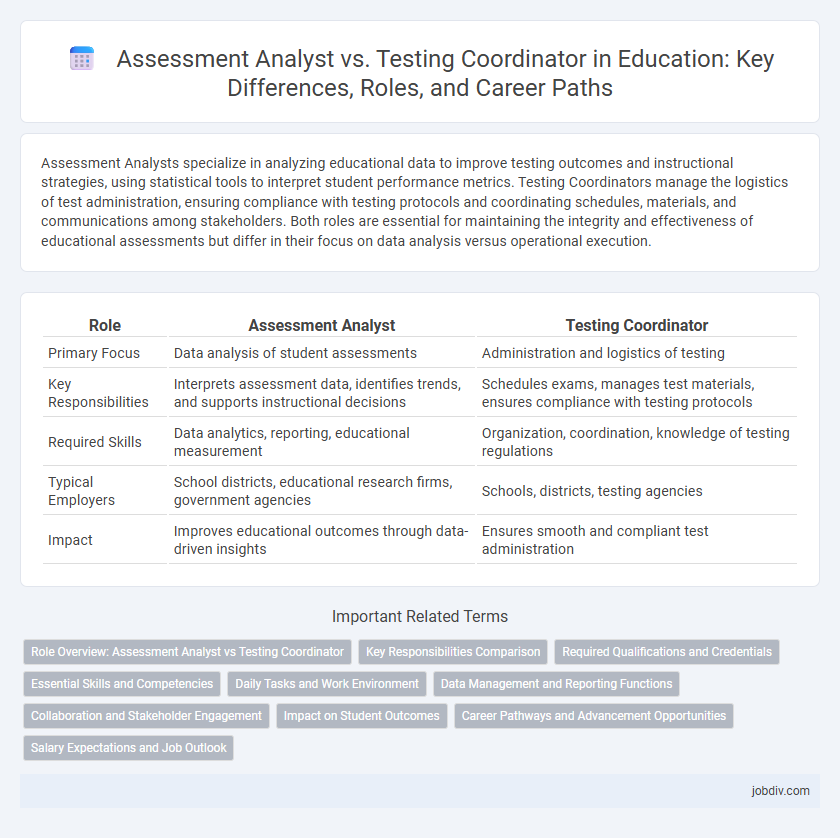Assessment Analysts specialize in analyzing educational data to improve testing outcomes and instructional strategies, using statistical tools to interpret student performance metrics. Testing Coordinators manage the logistics of test administration, ensuring compliance with testing protocols and coordinating schedules, materials, and communications among stakeholders. Both roles are essential for maintaining the integrity and effectiveness of educational assessments but differ in their focus on data analysis versus operational execution.
Table of Comparison
| Role | Assessment Analyst | Testing Coordinator |
|---|---|---|
| Primary Focus | Data analysis of student assessments | Administration and logistics of testing |
| Key Responsibilities | Interprets assessment data, identifies trends, and supports instructional decisions | Schedules exams, manages test materials, ensures compliance with testing protocols |
| Required Skills | Data analytics, reporting, educational measurement | Organization, coordination, knowledge of testing regulations |
| Typical Employers | School districts, educational research firms, government agencies | Schools, districts, testing agencies |
| Impact | Improves educational outcomes through data-driven insights | Ensures smooth and compliant test administration |
Role Overview: Assessment Analyst vs Testing Coordinator
Assessment Analysts specialize in analyzing educational data to improve testing strategies and student outcomes through data-driven insights. Testing Coordinators manage the operational aspects of administering exams, including scheduling, compliance, and logistics to ensure smooth testing processes. Both roles are integral to educational assessment but differ in focus: analytical evaluation versus administrative execution.
Key Responsibilities Comparison
Assessment Analysts design and implement data-driven evaluations to measure student performance and instructional effectiveness, focusing on interpreting assessment results to guide educational strategies. Testing Coordinators manage the logistics of test administration, including scheduling, compliance with testing protocols, and coordination between schools, students, and testing vendors. Both roles require strong attention to detail and data management skills but differ in emphasis on data analysis versus operational execution within educational assessments.
Required Qualifications and Credentials
Assessment Analysts typically require a bachelor's degree in education, psychology, or a related field, with strong skills in data analysis, statistical software, and educational measurement. Testing Coordinators often need a background in education administration or assessment, with certifications in test security, standardized testing protocols, and experience managing large-scale testing operations. Both roles benefit from familiarity with state and federal assessment regulations and proficiency in data reporting systems.
Essential Skills and Competencies
Assessment Analysts demonstrate expertise in data interpretation, psychometric analysis, and reporting to inform educational program improvements, while Testing Coordinators excel in logistics management, scheduling, and compliance with testing policies. Both roles require strong organizational skills, attention to detail, and proficiency in educational technologies, but Assessment Analysts prioritize analytical and statistical competencies. Testing Coordinators emphasize communication and problem-solving skills to ensure smooth test administration and adherence to regulatory standards.
Daily Tasks and Work Environment
Assessment Analysts analyze student performance data to develop insights for improving educational programs, collaborating with educators and administrators to design assessment tools. Testing Coordinators organize and manage the logistics of standardized testing, ensuring compliance with testing regulations and coordinating schedules, materials, and support staff. Both roles require strong data management skills and operate primarily within schools, districts, or educational organizations, with Assessment Analysts focusing on data interpretation and Testing Coordinators emphasizing operational execution.
Data Management and Reporting Functions
Assessment Analysts specialize in interpreting educational data, designing assessment frameworks, and generating detailed reports that inform instructional strategies and policy decisions. Testing Coordinators manage the logistical aspects of test administration, including scheduling, distributing materials, and ensuring compliance with testing protocols, with a secondary focus on collecting and organizing test data. While both roles involve data management, Assessment Analysts prioritize data analysis and reporting to influence educational outcomes, whereas Testing Coordinators focus on operational efficiency and accurate data capture during testing events.
Collaboration and Stakeholder Engagement
Assessment Analysts work closely with educators and data teams to interpret assessment results, ensuring that testing data informs instructional strategies and school improvement plans. Testing Coordinators engage with multiple stakeholders, including administrators, teachers, and external testing agencies, to organize and manage testing logistics, compliance, and communication. Both roles prioritize collaboration to enhance assessment accuracy and support informed decision-making within educational institutions.
Impact on Student Outcomes
Assessment Analysts utilize data analytics and psychometric methods to interpret student performance metrics, providing actionable insights that directly inform curriculum adjustments and targeted interventions. Testing Coordinators manage the logistics and administration of standardized assessments, ensuring compliance with testing protocols and minimizing disruptions, which supports accurate measurement of student achievement. Both roles critically influence student outcomes by balancing data-driven decision-making with effective test administration to enhance educational quality.
Career Pathways and Advancement Opportunities
Assessment Analysts specialize in data interpretation and reporting to improve educational outcomes, often advancing into roles like Data Scientist or Educational Researcher. Testing Coordinators manage the logistics and administration of exams, positioning themselves for leadership roles such as Assessment Director or Testing Manager. Both career pathways offer opportunities to influence educational policy but require distinct skill sets in data analytics versus operational management.
Salary Expectations and Job Outlook
Assessment Analysts typically earn an average salary ranging from $55,000 to $75,000 annually, reflecting their specialized skills in data interpretation and test design. Testing Coordinators usually have a salary range between $50,000 and $70,000, with job growth projected at a steady 5% over the next decade due to increasing standardized testing requirements. Demand for Assessment Analysts is expected to rise faster, driven by a growing emphasis on data-driven educational strategies and accountability.
Assessment Analyst vs Testing Coordinator Infographic

 jobdiv.com
jobdiv.com